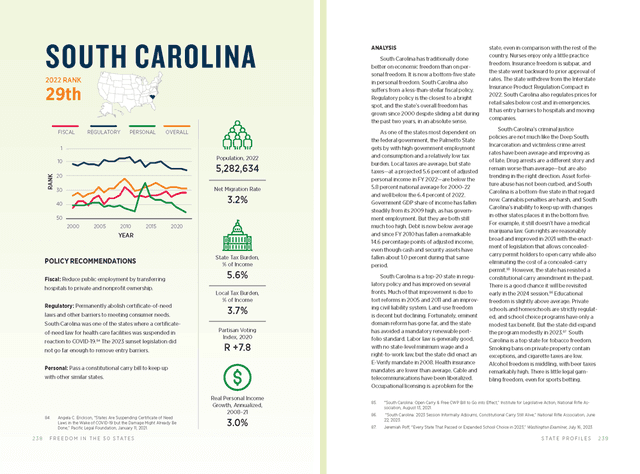Policy Recommendations
- Fiscal Reduce public employment by transferring hospitals to private and nonprofit ownership.
- Regulatory Permanently abolish certificate-of-need laws and other barriers to meeting consumer needs. South Carolina was one of the states where a certificate-of-need law for health care facilities was suspended in reaction to COVID-19. The 2023 sunset legislation did not go far enough to remove entry barriers.
- Personal Pass a constitutional carry bill to keep up with other similar states.
Analysis
South Carolina has traditionally done better on economic freedom than on personal freedom. It is now a bottom-five state in personal freedom. South Carolina also suffers from a less-than-stellar fiscal policy. Regulatory policy is the closest to a bright spot, and the state’s overall freedom has grown since 2000 despite sliding a bit during the past two years, in an absolute sense.
As one of the states most dependent on the federal government, the Palmetto State gets by with high government employment and consumption and a relatively low tax burden. Local taxes are average, but state taxes—at a projected 5.6 percent of adjusted personal income in FY 2022—are below the 5.8 percent national average for 2000–22 and well below the 6.4 percent of 2022. Government GDP share of income has fallen steadily from its 2009 high, as has government employment. But they are both still much too high. Debt is now below average and since FY 2010 has fallen a remarkable 14.6 percentage points of adjusted income, even though cash and security assets have fallen about 1.0 percent during that same period.
South Carolina is a top-20 state in regulatory policy and has improved on several fronts. Much of that improvement is due to tort reforms in 2005 and 2011 and an improving civil liability system. Land-use freedom is decent but declining. Fortunately, eminent domain reform has gone far, and the state has avoided a mandatory renewable portfolio standard. Labor law is generally good, with no state-level minimum wage and a right-to-work law, but the state did enact an E-Verify mandate in 2008. Health insurance mandates are lower than average. Cable and telecommunications have been liberalized. Occupational licensing is a problem for the state, even in comparison with the rest of the country. Nurses enjoy only a little practice freedom. Insurance freedom is subpar, and the state went backward to prior approval of rates. The state withdrew from the Interstate Insurance Product Regulation Compact in 2022. South Carolina also regulates prices for retail sales below cost and in emergencies. It has entry barriers to hospitals and moving companies.
South Carolina’s criminal justice policies are not much like the Deep South. Incarceration and victimless crime arrest rates have been average and improving as of late. Drug arrests are a different story and remain worse than average—but are also trending in the right direction. Asset forfeiture abuse has not been curbed, and South Carolina is a bottom-five state in that regard now. Cannabis penalties are harsh, and South Carolina’s inability to keep up with changes in other states places it in the bottom five. For example, it still doesn’t have a medical marijuana law. Gun rights are reasonably broad and improved in 2021 with the enactment of legislation that allows concealed-carry permit holders to open carry while also eliminating the cost of a concealed-carry permit. However, the state has resisted a constitutional carry amendment in the past. There is a good chance it will be revisited early in the 2024 session. Educational freedom is slightly above average. Private schools and homeschools are strictly regulated, and school choice programs have only a modest tax benefit. But the state did expand the program modestly in 2023. South Carolina is a top state for tobacco freedom. Smoking bans on private property contain exceptions, and cigarette taxes are low. Alcohol freedom is middling, with beer taxes remarkably high. There is little legal gambling freedom, even for sports betting.

